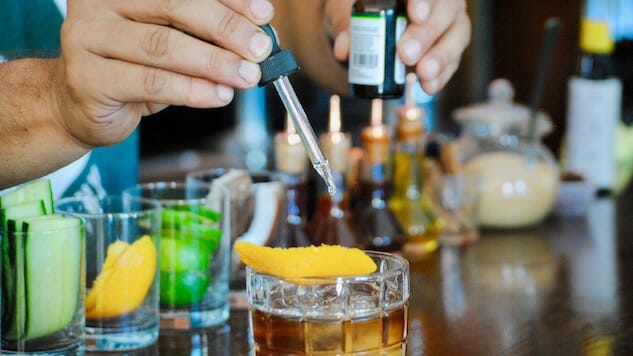CBD is So Hot Right Now: Should You Put it in Your Cocktail?
Photo credit: Lily Brown; NYC’s Adriaen Block has a full menu of CBD cocktails.
Fads, even when they are founded in something really good, always have backlash. It doesn’t matter whether the fad is righteous (consider not eating your body weight in meat) or dubious (stirrup pants). Even backlash backlash. In that spirit, the Food Police have been cracking down on Cannabinadiol, one of the active compounds in hemp (and hemp’s psychoactive relative marijuana). If this is confusing to you, you’re not alone. Yes, CBD is generally legal (in 47 states. Idaho, South Dakota and Nebraska, if you want alternatives to your anti-anxiety meds, sleep aids, anticonvulsant therapies, antidepressants and mood stabilizers, write your Congressmember.) And no, CBD is not psychoactive (though it is bioactive, as are coffee and turmeric and chocolate). Given that, you might be wondering why Health Departments would be coming down on bars and restaurants that put it in menu items.
The basic answer is state legality isn’t Federal legality and there are not currently clear overarching FDA guidelines designating CBD as an “approved food additive.” Are there clear health related reasons why that doesn’t exist? Not affirmatively. Like, you know how there’s a huge volume of data on the explicit health risks from alcohol (or tobacco) but yet these things are still legal? There is no equivalent data, scientific or anecdotal, suggesting CBD is potentially harmful. They just don’t have a huge pile of paper saying it definitely isn’t. If you’re thinking “Well, broccoli doesn’t have affirmative approval as a food additive and yet here I am adding it to my dinner,” you’re not alone.
Do we need to ensure our food additives and supplements are safe to use? Sure. Do we need regulation based on sound research? I won’t say we don’t. Do we need this to be enforced on CBD versus any of a million other additives and supplements that might or might not be safe or effective? Might-could depend whether we’re defining “need” as “feeling economically threatened by a plant substance that cannot be patented and might be as effective or more effective than pharmacological alternatives.”
It’s all enough to make a person a little cynical, really, so in an effort to cut through the noise, I spoke with Andrea Drummer, a cannabis cuisine expert and Food and Beverage Advisor for CannabisMD, about how the F&B landscape has changed with the rise of CBD, and how it’s changing again as food safety agencies descend on CBD with their talons extended. As you might imagine, it’s a complex… well, cocktail. “There’s still so much research to do,” she said, adding that failing to acknowledge that reality would ultimately threaten the mission of legitimizing a medicinal plant whose healing potential currently appears almost limitless.
Paste: People have been consuming cannabis for like 8000 years and mixing it with alcohol for probably just as long. With respect to extracted CBD, is it correct to say there are no known interactions with alcohol that would make mixing them clinically significant?
Andrea Drummer: Due to federal regulations not allowing for more scientific research on cannabis because it is a schedule 1 drug, there isn’t conclusive scientific evidence about the effects of CBD and alcohol interactions. There is limited research that shows that those who consumed CBD and alcohol had lower blood alcohol levels than those who consumed alcohol alone. However, since both products are relaxants, it is possible that using both together can make the effect more intense. The lesson is that there really need to be more studies, and laws need to be changed to allow for further research. Perhaps now that the Farm Bill has passed, as it relates to CBD, more research will be forthcoming.
Paste: Are there attributes to CBD that could, even theoretically, provoke a contraindication with alcohol? Or an enhancement for that matter – like caffeine is thought to improve the bioavailablity of MCT oil, and for that matter black pepper improves the bioavailability of curcumin.
-

-

-

-

-

-

-

-

-

-

-

-

-

-

-

-

-

-

-

-

-

-

-

-

-

-

-

-

-

-

-

-

-

-

-

-

-

-

-

-








































